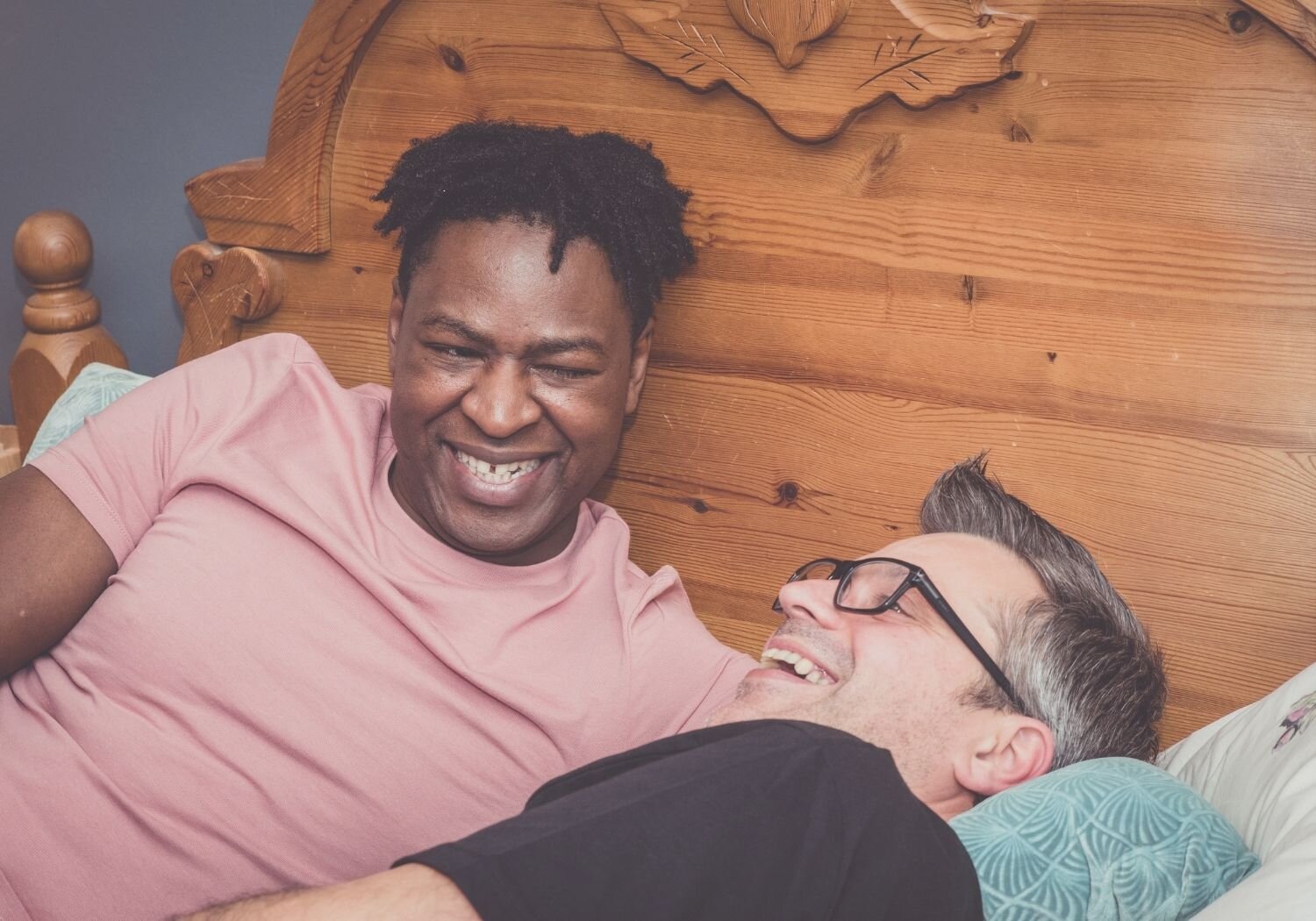6 Powerful and Effective Ways to Communicate Better in Relationships
In relationships, communication is key.
For a lot of long-term couples, learning how to communicate with your partner without fighting can feel like an unreachable goal. We’re not born with the ability to navigate conflict skillfully and many of us grow up without the benefit of role models who can show us how to communicate with a partner effectively.
The good news is that even if you didn’t grow up with good role models for how to talk with a partner about difficult topics, you can learn how to build better communication skills in your relationship.
This article offers six ideas to help you communicate more effectively. We’ve also included some couples therapy communication exercises you can do at home. (As you might guess, the question of how couples can improve their communication is a big one in couples counseling).
And the extra good news? If you’re looking for ways to reconnect as a couple and deepen your relationship, you can’t go wrong by starting with improving your communication.
And if you’re curious about your overall style in relationships, check out our Relationship Archetypes quiz.
As you read through this article, remember that Rome wasn’t built in a day and it’s equally true that you won’t be able to change the communication patterns in your relationship overnight.
Instead, focus on picking one communication skill to practice until you get the hang of it. Skillful communication in long-term relationships is all about practice.
The longer you’ve been in a relationship with someone, the easier it is to accidentally slip into old patterns of communicating. This doesn’t mean you won’t be able to change the ways you talk to each other, it just means you need to start small and to practice.
We encourage couples to focus on making small positive changes, because over time these changes can have a very positive effect on your relationship.
6 Ways to Communicate Better in Relationships
Make friends with your anger
Lots of people are raised to avoid expressing any anger or upset feelings. If you grew up in a family where anger was only expressed in passive aggressive ways or if you grew up with a parent who expressed anger in scary, out of control ways, you might avoid expressing anger.
These early associations make it difficult to separate the healthy emotion of anger from the unhealthy expressions of anger.
When it comes to relationships, anger tends to get a bad rap. but All people experience anger sometimes, so learning how to express it effectively in your relationship is a key communication skill.
When you have something to bring up with your partner, knowing how you’re feeling helps get the conversation off on the right foot.
Anger is frequently referred to as a "secondary" emotion, because it often comes in response to another feeling, like sadness, hurt, fear or anxiety. This means that when you’re angry, it’s worth pausing to take a deep breath and check in with yourself to see what you might be feeling in addition to your anger.
Taking time to check in with your feelings lets you share the full range of emotions with your partner, not just your anger. It gives your partner the opportunity to understand you better and have empathy for how you’re feeling, rather than just responding to your anger with defensiveness.
Saying something like “I’ve been wanting to talk with you about what happened this morning. I’ve been feeling angry about it, but now I also see my feelings were hurt when you walked away from me in the middle of our conversation and then left without saying goodbye” is more likely to receive an empathetic response than “I can’t believe the way you left this morning when I was trying to talk to you! Why do you always have to be such a jerk?”
If you tend to be conflict avoidant or uncomfortable expressing anger, remind yourself that anger is a healthy emotion that all humans experience at times.
In our work with couples, we see anger as an empowering and hopeful emotion— it says something’s not right but that it can change.
After all, if you didn’t believe your situation could change, you’d more likely feel despair and resignation rather than anger.
2. Learn How to Tell the Difference Between Thoughts and Feelings
Most of us don’t receive any education in identifying our feelings when we’re growing up. This is unfortunate, because emotional literacy (being able to accurately label your feelings) is a crucial relationship skill.
Confusing thoughts with feelings is a common source of communication problems in relationships (and it’s also associated with depression in adults). In relationships, the confusion between thoughts and feelings inevitably leads to frustrating attempts to talk about problems.
For example, let’s say you’ve been worried that your partner is losing interest in you and doesn’t seem to care about you in the same way they did in the past, which leads you to say, “I feel like you don’t care about me anymore.”
While It can seem like you’ve just shared your feelings, what you’ve actually expressed is an interpretation of your partner's feelings.
When you’re on the receiving end of this sort of statement, it sounds like an attack. The "you don't care about me" is heard way more loudly than "I feel like." It’s likely that your partner would jump in to defend themselves and point to actions that disprove your statement . . . something like "That’s not true! Look at all the things I do for you!”
Because their response shifts the conversation from your original feeling to them justifying all the good things they do for you, it’s likely you’ll feel dismissed and unheard. Cue the very familiar unproductive argument that goes nowhere.
On the other hand, being able to talk about your feelings by saying “I’ve been feeling disconnected from you lately and I’ve noticed myself worrying that you don’t care about me anymore” keeps your feelings of disconnection and worry at the center of the conversation and is more like to lead to a productive conversation.
One way to get better at separating thoughts from feelings is to perform this simple test: Feelings can usually be summed up in one or two words (heartbroken, happy, confused, etc.) while thoughts disguised as feelings often start with “I feel like . . . ” If you remove the “I feel like” you would still have a complete sentence, “You don’t care about me anymore.” When you remove the “I feel like” at the beginning of the sentence, it’s easier to see that the statement will probably sound like an attack on the other person.
3. Find the Right Moment, but Don’t Wait Too Long
When there’s something on your mind that you’d like to talk with your partner about, it’s best to talk at a time when you can both be fully focused on the conversation, rather than trying to have a difficult conversation at a time when either of you is stressed, hungry, or preoccupied with something else.
Sometimes the best way to make this happen is to say, “There’s something I’d like to talk with you about. When would be a good time for you?”
Another alternative is to say, “I’d like to talk to you about something that’s on my mind. Is now a good time?”
As important as it is to find the right moment, it’s equally important to not put off the conversation indefinitely, waiting for a time that feels just right.
It’s tempting to avoid initiating a difficult talk when you’re not confident that you’ll be able to resolve anything. In the short run, it can seem easier to not bring it up at all and hope the problem goes away.
Couples often tell us that they haven’t brought up certain issue because it’s never the “right” time. This ends up creating a catch-22: issues aren’t addressed when things are going well because “Why rock the boat?” When things are bad, the reason for avoiding the conversation becomes “Why make things worse than they already are?”
Over time, avoiding hard talks leads to all conversation drying up, so couples end up not having much to say to each other about anything meaningful.
Unaddressed problems in intimate relationships are like big rocks that are placed in the middle of a stream, slowing the flow of the water. Over time, debris collects around the rock and the flow of the stream is blocked.
Where once conversation flowed freely, it’s now being blocked up by what’s not being said.
Couples who feel disconnected often tell us they feel discouraged because they have nothing to say to each other. If this hasn’t been going on too long, we’re often able to trace the source of disconnection back to a time when there was a serious issue they never talked about.
Once this issue is talked about, conversation starts to flow again and many couples discover they still have a lot to talk about.
We’ve seen lots of couples have hard conversations about their lack of intimacy and closeness, and come out of that conversation feeling closer to each other than they have in years.
If you find yourself avoiding difficult conversations, you can get better at this important skill. Practice having low-stakes disagreements with your partner. One easy way to do this is with our Date Night Movie of the Month Club, which lets you talk about relationships within the context of a movie discussion about other people’s relationships, rather than talking directly about your relationship.
4. Make sure your verbal and nonverbal communication match
We’ve all had the experience of talking to someone who is not congruent: what they’re saying and what their body language and tone of voice are communicating don’t match.
Imagine you’re sitting at a table with a friend and there’s one cookie left on the plate in the middle of the table. You ask if it’s okay if you eat the last cookie and your friend says, “Sure,” in a hesitant tone while frowning. Do you eat the cookie? If you’re like most people, you’ll either suddenly lose your appetite or you’ll eat the cookie while feeling vaguely uncomfortable.
Research suggests that about 80% of what’s communicated in an interaction is nonverbal and that we prioritize nonverbal messages over verbal messages when they conflict.
As humans, we’re finely attuned to nonverbal cues from others. One important difference between verbal words and nonverbal cues is that cues don't require us to actively think about them. Sometimes we’re not even aware we’re reading nonverbal cues because we understand them intuitively.
In an intimate relationship, frequent incongruity (mismatch) between verbal and nonverbal communication is especially problematic because it leaves the other person in a bind similar to the cookie problem above . . . but with much larger stakes.
One way this happens in relationship is when a partner insists they’re “fine” in an angry, tense tone of voice with body language that also reflects anger. The words say everything’s okay but the body says "don't ask," and the experience leaves both people feeling confused, anxious, and misunderstood.
Because we’re biologically wired to detect signs of distress in our intimate partners, when a partner seems upset but insists they’re fine, it creates confusion and self-doubt for the one who is correctly intuiting that some big feelings are happening just below the surface.
And it presents the partner with a lose-lose situation. Either they respond to the verbal statement which doesn’t feel believable or they respond to what’s being communicated nonverbally and risk being on the receiving end of “I told you I’m fine!” in an even more intense tone of voice.
If you have a tendency to communicate in ways in which your verbal and nonverbal cues don’t match, you can develop the skill of saying something like, “I’m not sure how I’m feeling right now. I should probably figure that out before we talk about it” or “I’m upset but not quite ready to talk about it yet.”
This confirms for your partner that something is going on with you, but also gives you space to figure out what it is and how you’d like to approach it with them.
If your partner is the one whose communication is incongruent, you can acknowledge that in a kind, supportive way without directly challenging their verbal statement. “It seems like you’re processing something right now. Let me know when you’d like to talk” can be a helpful way to do this.
Statements like this help both people not feel trapped in an incongruent situation by relieving the tension without ignoring the issue. It’s also helpful because it opens the door to allowing your partner to decide how much information they’d like to share, when they’re ready.
5. Practice the art of listening
Neuroscience shows that the human brain cannot multitask. During difficult conversations, try to give your partner the gift of your full attention. Make an effort to eliminate distractions while you’re having a conversation. Putting your full attention on what your partner is communicating to you also helps minimize the likelihood of misunderstandings.
As much as possible, listen to your partner with patience and curiosity. So often when we’re supposed to be listening, what’s actually happening is we are waiting for our turn to talk again. We’re not talking . . . but we’re not truly listening.
Especially when there have been repetitive arguments in your relationship, it’s easy to make the mistake of thinking you know what your partner is going to say.
Suddenly, instead of really listening, you’re busy composing your response in your head. (And if you happen to come up with a zinger and start debating about whether or not to keep it to yourself or let it fly, you’re really not listening any more.) This is a time to slow down and try to really focus your attention on what’s being said.
If you notice that you're rehearsing, debating what to say, or think you "know" what the other person is saying, great! you’ve become aware that you’ve stopped listening.
Now you’re able to reorient your focus to what your partner is saying. Taking a deep breath can signal your body to relax and slow down, so you can really focus your attention on what’s being said.
In other words, separating what your partner is communicating from your own internal dialogue in response to the situation is crucial. It is a major skill in developing the art of listening well.
We all sometimes make assumptions about what our partner is thinking or feeling that have more to do with the old stories we carry inside about ourselves. These old stories don’t really don’t have anything to do with what our partner is trying to say but when these old stories are activated, we can be very reactive to our partner (who also has their own internal stories).
When both people are activated in these ways, attempts at having a reasonable conversation about a relationship problem can get derailed very quickly.
Brené Brown, expert on courage and vulnerability in relationships, recommends using the phrase “The story I’m telling myself is that you think/feel . . . .”
This phrase can work like magic to transform an interaction. Instead of interrupting your partner mid-sentence to say, “I get it— you think I’m a total jerk!” you might instead say, “I’m guessing this isn’t necessarily true, but the story I’m telling myself right now is that you think I’m a total jerk.”
Sharing your feelings in this way isn’t an accusation or attack and it’s more likely to invite an empathetic response for your partner.
Asking questions to clarify what you hear your partner saying is part of being a skillful listener too. One way you can do this is to check in to make sure you’re hearing your partner correctly and not reading into—or entirely misreading—what they’re saying.
Using phrases like “What I hear you saying is . . . ” or “If I’m hearing you right . . . ” helps you not jump to conclusions about what’s being said and avoid misunderstandings that can rapidly transport an argument into non-productive territory.
Checking in to see if you’re understanding your partner correctly is a way of communicating openness and a desire to understand their thoughts and feelings.
In our experience, relationship magic happens when couples learn how to listen to each other with empathy during tense discussions.
The next time you’re having a hard conversation with your partner, try listening below the surface of their words and see if you can understand what they’re really trying to communicate.
This means paying attention to their words and their nonverbal cues from a receptive, non-defensive, position.
One of the best ways to practice this is share what you heard them say, to see whether you’re correctly understanding them. “If I’m hearing you right, what you’re saying is . . . ” lets your partner know that you want to understand what they’re saying.
It can obviously be difficult in the heat of an argument to remember to check in to make sure you’re understanding your partner, but it’s well worth the effort to learn how to do this.
Communicating an openness to listening and making the effort to understand their point of view or experience is an expression of genuine care and respect for your partner and it can often help you avoid the sorts of unproductive arguments that happen when you’re both misunderstanding each other.
6. Remember that hard conversations aren’t ‘one and done’
Reset your expectations for the conversation so you don’t approach it as something to get over with as quickly as possible.
In our experience, couples are far more successful at working through difficult problems when they approach the issue as an ongoing conversation rather than as a discussion they can have once and then never have to talk about again.
When couples try to get it over with and move on, they end up feeling hopeless and frustrated when the issue inevitably comes up again. If your expectation is to just talk about it once and then move on, it’s easy to end up feeling like your brave attempt to talk it through went nowhere.
Instead, if you approach the conversation with an expectation that this is just the first in a series of conversations about the topic, then you know that you don’t have to figure everything out today.
It takes all the pressure off. You’re able to learn from what worked and what didn’t as you continue to talk through the problem over time, with an attitude of confidence and working together to solve problems.
This lets you frame the conversation as “What can we do differently to solve this problem together?” Now you’re together, on the same side, working toward a common goal, rather than squaring off against each other to see which of you is going to win the argument.
It can be difficult to stay in the mindset that acknowledges that hard topics require multiple conversations. This is especially true if it is anchored in a conflict that is longstanding.
One thing that might help is to remember that talking through hard issues is the key to having fulfilling relationships. It’s the key not because you get an immediate solution to your problem. It’s the key because the process of working through difficult issues helps you both develop as communicators, learn how to trust each other, and grow together in your relationship in ways you never imagined when you first got together.
Couples Therapy Communication Exercises You Can Practice At HomE
For easy reference, here are each of the communication exercises you can practice at home to communicate more effectively with your partner.
1. When you're angry, check in to see if you have any other feelings along with your anger. Sharing how you're feeling with your partner "I've been feeling hurt and angry about what happened" is more effective than "I'm really pissed off at you right now."
2. Learn to tell the difference between your thoughts and feelings. Saying, "Lately I've been feeling disconnected from you and I'm worried you don't want to spend time with me" will help your partner be more open to listening that if you approach them with "I feel like you don't care about me anymore."
3. Find the right time to talk. "There's something I'd like to talk to you about. Is now a good time?" or "When would be a good time to talk?"
4. If you struggle to know how you're feeling in ways that make your verbal and nonverbal communication not match, saying, "I’m not sure how I’m feeling right now. I should probably figure that out before we talk about it," or "I'm not quite ready to talk about this. Can we talk about this later?" are preferable to "I'm fine" said in a tone that communicates you're anything but fine. If your partner's communication isn't matching, you can acknowledge this by saying, "It seems like you’re processing something right now. Let me know when you’d like to talk."
5. Level up your listening with these phrases: "The story I'm telling myself right now is . . .." and "If I'm hearing you correctly, what you're saying is . . ."
Conclusion
Learning how to have hard conversations in ways that help bring you closer together as a couple rather than driving you apart takes practice. But it’s well worth the time and effort, which will help you avoid the common pitfalls in relationships that lead to unproductive fights and a loss of connection with your partner.
Want more? Sign up for our free relationship communication class, The Communication Cure. You’ll get instant access, so you can begin your journey to better communication today.
About Us
We help those with painful childhood experiences to heal your relationship with yourself, deeply connect with others, and learn the skills for having fulfilling relationships.
Fulfilling relationships are an essential part of living a good life and yet, many of us (perhaps even most of us) have core wounds from childhood experiences that affect our ability to have the kinds of intimate relationships in adulthood that we long to have.










